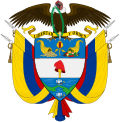Background
Following a spate of political violence, an unofficial referendum on forming a Constitutional Assembly was held alongside the March 1990 parliamentary elections. An official referendum was later held in May, which saw 96% of voters vote in favour of convening an Assembly.
Elections for the Assembly were held in December 1990, and a new constitution was promulgated in July 1991.
The Constitutional Assembly passed the Acto Constituyente de Vigencia Immediata on 18 June 1991, which called for fresh Congressional elections in October, with the newly elected Congress replacing the one elected under the previous constitution in 1990. [2]
This page is based on this
Wikipedia article Text is available under the
CC BY-SA 4.0 license; additional terms may apply.
Images, videos and audio are available under their respective licenses.
